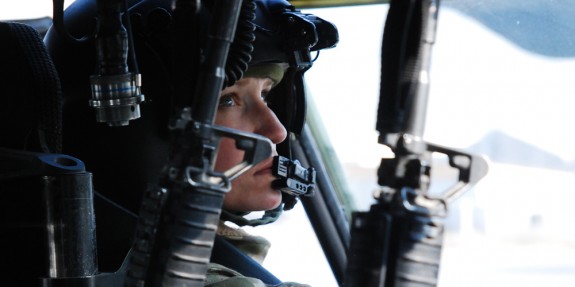Why don’t civilians ask veterans more questions?
By Lauren McAlpine on November 11, 2019 in News + Updates
I love asking questions. As a journalist, I don’t just ask people what they do — I interrogate them, be they scientists or teachers or sculptors, to find out the terminology of their field, the kinds of characters that populate it, and the questions they think about that might never even occur to someone outside their orbit.
That is: until I dated an Army reservist who, just about a year before we met, had returned from a tour of duty in Iraq.
When it came to the topic of his service, my normally inquisitive nature seemed to dry up and shrivel, like a time-lapse video of a decaying plant. It wasn’t that I had questions that I held back from surfacing; I simply didn’t know what to ask. Still, years later, I’m not sure what the block was about. Was it that going to war in Iraq feels so drastically different from my experience as a writer in New York City that I couldn’t find the common ground from which good questions stem? Or was it the opposite: that I’d seen enough war movies to feel like I had a reasonable idea of what it was like and, especially after The Hurt Locker, was scared to have my suspicions confirmed? Maybe it’s that I’d heard so much about how difficult returning to everyday life can be for veterans that I wanted to give him the space to inhabit a new life. Or maybe it was that the fast and furious coverage on CNN and other 24-hour news outlets somehow managed to make the Iraq War and War in Afghanistan seem especially remote and far away, since despite regular reports of bombing and armed conflicts, day-to-day life for me didn’t seem to change that much.
In his TED Talk, Wes Moore, author of The Other Wes Moore and a paratrooper and Army captain in Afghanistan, shares the lone two comments he gets from civilians when he tells them he served: “Thank you for your service” and “Did you shoot anyone?” The first seems kind enough, but Moore sees it as a brush-off, an opportunity for the conversation to move on before venturing anywhere uncomfortable. As for the second, he says, at least it shows some type of curiosity.
It did, of course, occur to me to ask my then-boyfriend, “Did you kill anyone?” But it also felt hugely insensitive, and if the answer were yes, what would I have done with that information? John Ismay reflects on this question in a lovely essay for PolicyMic: “The question isn’t about that vet. It’s about you, and your own morbid curiosity about an experience outside your own life’s script.”
For veterans, could this division of scripts lead to a heightened sense of alienation? Sebastian Junger — a longtime war reporter who embedded in Afghanistan’s Korengal Valley, which saw a high percentage of fighting in the country — notes in his TED Talk that soldiers often miss war because of the incredible sense of brotherhood and connection that develops in combat situations, where each individual cares more about the well-being of others than their own. Returning home to find so many people unwilling to ask simple questions must certainly further an in-group, out-group feeling.
Moore suggests a few simple questions to start surfacing the stories of veterans:
“What did you do there?”
“What was the food like?”
“What was the experience like?”
Meanwhile, The Public Insight Network put together this list of questions veterans themselves wished people would ask them. A few especially stuck out:
“How did your military service shape the person you are today?”
Another is stunningly simple:
“How are you doing?”
I know that next time I meet a veteran, I will definitely ask these questions and many others as well. My curiosity is reignited to hear how the experience of war feels to individuals in uniform, and how the real thing differs from Hollywood versions of it. I encourage others to ask these questions too. And for veterans, please know: Our silence isn’t because we don’t care or want to know more. We just might not be sure of how to start the conversation.
–
ABOUT THE AUTHOR
Kate Torgovnick May is a writer at TED.com. She can also solve a Rubik’s Cube in less than two minutes. Read more about her work at KateTorgovnickMay.com.
Photo: Captain Peter Smedberg/The U.S. Army.
This post was originally published on TED Ideas. It’s part of the “How to Be a Better Human” series, each of which contains a piece of helpful advice from someone in the TED community; browse through all the posts here.
